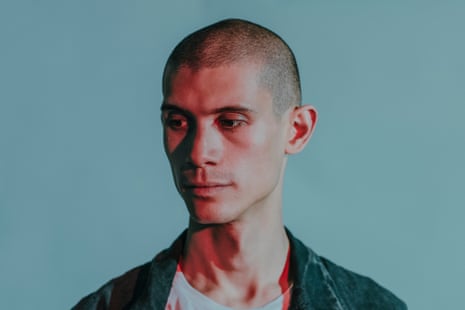It is 4am on a balmy June night in Barcelona, and on a beachside stage at Primavera Sound festival, one of the finest talents in electronic music is leaping into the unknown. TJ Hertz, AKA Objekt, is one of the most beloved DJs and producers around. His tracks and albums routinely top end-of-year lists in the dance music press; their density and technique pleases the chinstrokers at the back, while their goofiness and fun gets hands in the air down the front.
The Guardian’s product and service reviews are independent and are in no way influenced by any advertiser or commercial initiative. We will earn a commission from the retailer if you buy something through an affiliate link. Learn more.
And yet this is his first ever live set, a show he brings to the UK this week. Hertz stands behind a bank of equipment playing crystalline, deconstructed club music and singing through a vocoder while Ezra Miller, a young American visual artist, stands opposite triggering mesmeric visuals in time with the staccato beats and broken melodies.
The show represents Hertz’s desire to “find a way to connect with people from beyond the club world”, as he explains over tea at his airy apartment in the Kreuzberg district of Berlin a few weeks later. “I wanted to give people who might not usually find themselves on a dancefloor a route into listening to electronic music that they might otherwise find quite out-there.”
As a slow convert to electronic music himself, Hertz knows the power of a good gateway drug. Born in Japan in 1987 to a Filipino mother and British-American father, he spent his formative years in Belgium and, from the age of 11, the UK. His mother was a composer and there were always plenty of records around the house, but his childhood and teenage years were spent playing the drums, completely ignoring electronic music.
It wasn’t until around 2007, when the “blog house” phenomenon – the trashy, clubby sound from acts and labels like Justice and Ed Banger – blew up that Hertz took any notice. “My only exposure to dance music before that was the Vengaboys and Tiësto and whatever other awful shit was on The Box,” he laughs. “It’s ironic that blog house and Ed Banger were what finally got me into it, because in retrospect they weren’t much better than the Vengaboys or Tiësto, but at least they had a slightly better aesthetic.”
By then, Hertz was at Oxford University studying engineering. “By the time I went to uni I had given up on the idea of drumming professionally, but promised myself that I would keep doing it as a hobby – I just transferred the promise from drumming over to DJing and production,” he says. He started DJing in bars around Oxford and playing around with production programmes, and by the time he left university was good enough to land a development job in Berlin with the music software manufacturer Native Instruments. He kept producing on the side and his burgeoning hobby finally culminated in the release of his first EP, Objekt #1, in 2011.
His two albums since, 2014’s Flatland and last year’s Cocoon Crush, are fascinating adventures in deeply textured, frequently arrhythmic and highly atmospheric sound design. Running in parallel is the completely different universe of his 12-inch singles, with which he takes on whatever club-music style takes his fancy. Last year’s rave-referencing Theme from Q joined a canon of tracks including the big-room techno of CLK Recovery, the wobbly dubstep of Cactus and the popping electro of Fishbone.

As a DJ, too, Hertz is an innovator in a world plagued by single-speed staleness and conservatism. Where many DJs plug in a USB, knock out two hours of techno and collect their fee, Hertz has always looked to push the form forward, whether by deploying delay pedals and CDJ trickery to reshape a record on the fly or by using polyrhythmic mixing techniques to pull off transitions between the unlikeliest of sounds. His 2017 Dekmantel mix is the best place to hear the latter skill in action: ambient soundscapes, jungle, wonky synth tracks and pounding techno sluice around each other. It should be a terrible mess – but it works.
Hertz is known for his ability to read and react to a crowd, lathering audiences into a grinning, ceiling-slapping frenzy – and an essential part of it is his filing system. He flips open his laptop and takes me through the dozens of folders he studiously maintains and adds to on a daily basis: “Curious George”, “Witching Hour”, “Floaty Rollers”, “Gritted Teeth”, “Emosh (Very)” and “Emosh (Liminal)”, “Recent Power Selection”, “Recent Festival”, “No-kick Rollers”…
A man who wrings whimsy from the dry stuff of computer folders, Hertz is neither stuffy boffin nor tongue-lolling rave lad, but rather self-deprecating and unassuming. “I often sit down in the studio and feel like I’ve completely forgotten how to make music,” he admits endearingly. Despite years of critical acclaim this is no false modesty: Hertz had been touring internationally for three years and had made his second album before he finally felt able to quit his day job.
Back in Barcelona, Hertz’s movements are being mapped to a gigantic, bumptious-looking dust mite on the screen behind him in the lead-up to a brilliantly theatrical final section that transforms a slow-building, artful electronics workout into a full-on rave complete with lasers, horns and piledriving 303 synths. The show is Hertz’s career in microcosm: fearlessly innovative, intricately detailed, obsessively well-executed and – most importantly – glorious, sweaty fun.
Objekt and Ezra Miller play at the Islington Assembly Hall in London on 12 September.

Comments (…)
Sign in or create your Guardian account to join the discussion